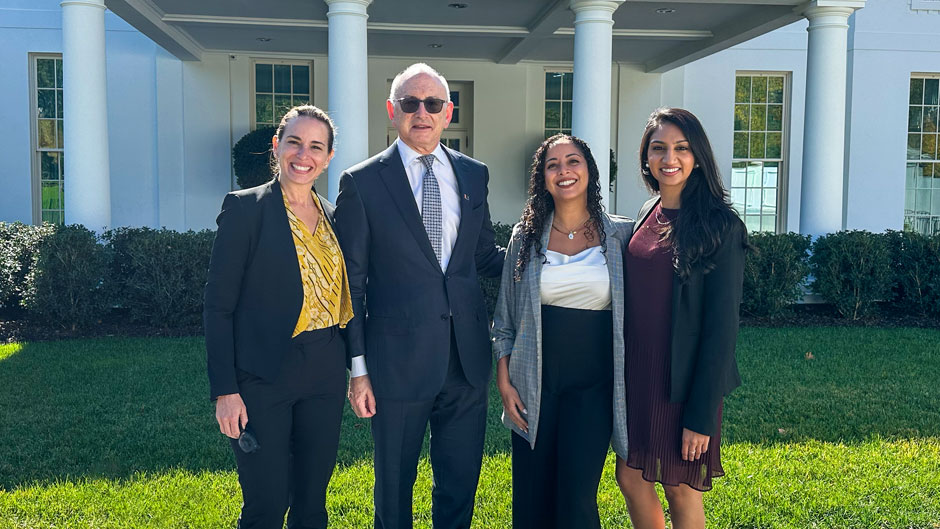A delegation of leaders from Sylvester Comprehensive Cancer Center, which is part of the University of Miami Health System, visited the nation’s capital recently to share some of the groundbreaking research happening at the National Cancer Institute (NCI)-designated cancer center.
They visited the White House, and several other federal agencies, as part of a renewed focus on the Cancer Moonshotinitiative, launched by President Joe Biden. The initiative aims to cut American cancer death rates in half within the next 25 years. Currently, cancer is the second leading cause of death in the nation.
Dr. Stephen D. Nimer, director of Sylvester and executive dean of research at the Miller School of Medicine; Dr. Erin Kobetz, vice provost of research and scholarship for the University, as well as director of its Firefighter Cancer Initiative(FCI); and Dr. Alberto Caban-Martinez, deputy director of the FCI and assistant provost for research integrity at the Miller School of Medicine; joined Shreya Dilip Kuntawala, director of the government relations for the University and UHealth, in visiting the White House, the National Institutes of Health, the Federal Emergency Management Agency (FEMA), the U.S. Department of Agriculture, and the U.S. Department of Defense. At the White House, they met with leaders of the Cancer Moonshot team, including its coordinator, Dr. Danielle Carnival.
“This trip reflects a recognition of our ability at Sylvester to contribute to cancer knowledge on the national stage,” Nimer said.
Sylvester—which received its NCI designation in 2019—has been able to increase survivorship rates above U.S. averages for many patients with cancer, including multiple myeloma, pancreatic cancer, brain and central nervous system cancers, as well as bone and joint cancers, according to Surveillance, Epidemiology and End Results data collected by the NCI. It is the only NCI-designated cancer center in South Florida, and one of just two NCI facilities in Florida.
“The Cancer Moonshot is about providing more access to groundbreaking care and clinical trials, and about accelerating scientific discovery in cancer. It will also impact the lives of people in our diverse community who are at risk for cancer, and who need cancer screening and prevention,” said Nimer, who is the Oscar de la Renta endowed chair of cancer research, and who met with then-Vice President Biden, in 2015, when he was crafting the initial Cancer Moonshot initiative. “This week’s meeting provided an opportunity for us to share the discoveries and progress we have made with patient care in South Florida, and by conducting multi-disciplinary research. We had the opportunity to present how our strategic plan aligns with the Moonshot, and to affirm our desire to work closely with our fellow NCI-designated cancer centers across the nation, to reduce the cancer burden.”
According to the National Institute for Occupational Safety and Health, firefighters are 9 percent more likely to face a cancer diagnosis and are 14 percent more likely to endure a cancer-related death. Biden spoke to this dangerous link during a Summit on Fire Prevention and Control the same week the Sylvester team was in the nation’s capital. The desire to reduce this harmful trend helped start the FCI in 2015.
At the White House, Kobetz explained some of the work that the FCI has been doing to understand and reduce the cancer burden on firefighters by developing programs and tools to inform them about how to clean and remove harmful carcinogens from their bodies and their gear. She also spoke about Caban-Martinez’s involvement in the World Health Organization (WHO) team that helped reclassify firefighting as a carcinogenic-risk profession last summer.
“These conversations allow us to explore the possibility of further collaboration with government agencies on a shared agenda related to cancer research, increasing equity in research participation, and addressing disparities in cancer outcomes, such as what’s observed in firefighters,” said Kobetz, who is also associate director of population health and cancer disparities for Sylvester and started the FCI at the request of firefighters. She later worked to secure state funding for it.
Caban-Martinez said it was a pleasure to present to FEMA and NIH leaders because the meetings help raise awareness about how to combat cancer in the fire service.
“Meeting with agency leaders—who are our most ardent and long-standing research partners—not only helps us gain insight into our FCI research findings and progress, but also bolsters opportunities to disseminate our findings to key stakeholder groups,” said Caban-Martinez, an occupational epidemiologist. “This helps further the FCI mission to prevent and extinguish cancer in the firefighter workforce.”
The day after Sylvester leaders returned from D.C., first lady Jill Biden visited Sylvester Comprehensive Cancer Center in Plantation, Florida, to mark Breast Cancer Awareness month and further highlight the efforts of the Cancer Moonshot initiative.
“It was a promising week for Sylvester’s cancer research and outreach,” said Kuntawala. “These visits and advocacy trips serve as an amazing way to highlight the great work of UM’s physicians, research, and cutting-edge advancements. We look forward to continuing to work in collaboration with key federal partners to expand upon this impactful work.”
Kobetz said that she enjoyed her first trip to the White House and hopes the discussions will allow Sylvester to work more closely with national health care leaders.
“This trip reaffirmed for many individuals and agencies with whom we met that Sylvester is an innovator, a leader, and a ready partner to advance a shared commitment to reducing cancer incidence and mortality,” Kobetz said.

